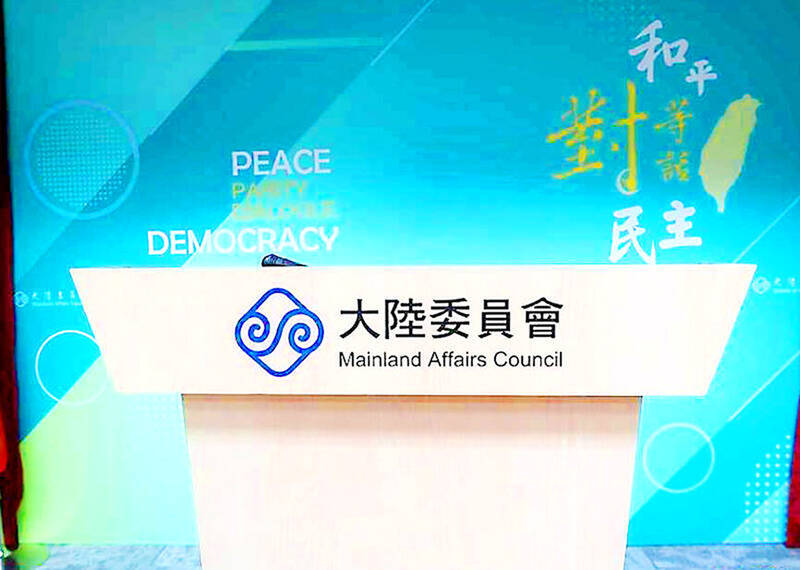China has no jurisdiction over Taiwan, and its so-called laws and norms have no binding force on Taiwanese, the Mainland Affairs Council (MAC) said yesterday as it called on Taiwanese “not to be threatened and intimidated” by the Chinese Communist Party (CCP).
The council issued the remarks after China earlier in the day threatened to impose the death penalty in extreme cases of what it called “diehard Taiwanese independence separatists.”
China’s state-run Xinhua news agency yesterday said the Chinese government unveiled guidelines that say its courts, prosecutors, public and state security bodies should “severely punish Taiwanese independence diehards for splitting the country and inciting secession in accordance with the law, and resolutely defend national sovereignty, unity and territorial integrity.”

Photo: Chung Li-hua, Taipei Times
The guidelines are in accordance with the law, including the 2005 “Anti-Secession” Law, Xinhua said.
Chinese Ministry of Public Security official Sun Ping (孫萍) yesterday told a news briefing in Beijing that the maximum penalty for the “crime of secession” was the death penalty.
“The sharp sword of legal action will always hang high,” she said.
The guidelines detail what is considered a crime worthy of punishment, including promoting Taiwan’s entry to international organizations where statehood is a condition, having “external official exchanges,” and “suppressing” groups or people promoting “reunification.”
The guidelines define “other acts that seek to separate Taiwan from China” a crime — a vague definition that could be interpreted in different ways.
The rules took effect in China yesterday, Xinhua said.
The MAC said that Beijing’s announcement is regretful, adding that it only highlighted the absolute and fundamental differences in the systems of government between Taiwan and China.
Under the Republic of China’s Constitution, Taiwan’s 23 million people enjoy rights to freedom and democracy, and such rights cannot be taken away from them, the MAC said.
The CCP’s regulations have no authority over Taiwanese, it added.
China’s actions serve only to sow discord among people on either side of the Taiwan Strait and severely harm civil exchanges, it said.
Such acts are also an “uncivilized and brutish challenge” against free and democratic countries that love Taiwan and support its democracy, the MAC said.
Taiwan Thinktank researcher Wu Se-chih (吳瑟致) said that Beijing’s clear stance on using the law as punishment is an attempt to place more pressure on Taiwanese and increase the efficacy of its legal warfare tactics.
National Cheng Kung University political science academic Hung Chin-fu (洪敬富) said legal warfare has been an oft-seen method of oppression since the 20th National Congress of the CCP in October last year.
The guidelines issued by the CCP yesterday do not mention the scope of the law’s enforcement, giving rise to selective enforcement on isolated individuals to make an example and deter people through fear, Hung said.
Hung and Wu urged Taiwanese to exercise caution when contemplating a visit to China, and ensure that their past actions and speech do not contravene its laws.
Additional reporting by Wu Che-yu

ACTION PLAN: Taiwan would expand procurement from the US and encourage more companies to invest in the US to deepen bilateral cooperation, Lai said The government would not impose reciprocal tariffs in retaliation against US levies, President William Lai (賴清德) said yesterday, as he announced five strategies to address the issue, including pledging to increase Taiwanese companies’ investments in the US. Lai has in the past few days met with administrative and national security officials, as well as representatives from various industries, to explore countermeasures after US President Donald Trump on Wednesday last week announced a 32 percent duty on Taiwanese imports. In a video released yesterday evening, Lai said that Taiwan would not retaliate against the US with higher tariffs and Taiwanese companies’ commitments to

‘SPECIAL CHANNEL’: Taipei’s most important tasks are to stabilize industries affected by Trump’s trade tariffs and keep negotiations with Washington open, a source said National Security Council Secretary-General Joseph Wu (吳釗燮) arrived in the US for talks with US President Donald Trump’s administration, a source familiar with the matter said on Friday. Wu was leading a delegation for a meeting known as the “special channel,” the Financial Times reported earlier. It marked Trump’s first use of the channel since returning to the White House on Jan. 20. Citing a source familiar with the matter, the Financial Times reported that Minister of Foreign Affairs Lin Chia-lung (林佳龍) was also a part of the delegation. The visit came days after China concluded war games around Taiwan and amid Trump’s

Intelligence agents have recorded 510,000 instances of “controversial information” being spread online by the Chinese Communist Party (CCP) so far this year, the National Security Bureau (NSB) said in a report yesterday, as it warned of artificial intelligence (AI) being employed to generate destabilizing misinformation. The bureau submitted a written report to the Legislative Yuan in preparation for National Security Bureau Director-General Tsai Ming-yen’s (蔡明彥) appearance before the Foreign Affairs and National Defense Committee today. The CCP has been using cognitive warfare to divide Taiwanese society by commenting on controversial issues such as Taiwan Semiconductor Manufacturing Co’s (TSMC, 台積電) investments in the

HELPING HAND: The steering committee of the National Stabilization Fund is expected to hold a meeting to discuss how and when to utilize the fund to help buffer the sell-off The TAIEX plunged 2,065.87 points, or 9.7 percent, to close at 19,232.35 yesterday, the highest single-day percentage loss on record, as investors braced for US President Donald Trump’s tariffs after an extended holiday weekend. Amid the pessimistic atmosphere, 945 listed companies led by large-cap stocks — including Taiwan Semiconductor Manufacturing Co (TSMC, 台積電), Hon Hai Precision Industry Co (鴻海精密) and Largan Precision Co (大立光) — fell by the daily maximum of 10 percent at the close, Taiwan Stock Exchange data showed. The number of listed companies ending limit-down set a new record, the exchange said. The TAIEX plunged by daily maxiumu in just